Table of Contents
The topic of mental health has become more and more important in recent years. Different periods of life, whether in the sports or personal life, can have a huge impact on people. Life is not a bed of roses. Sometimes it can bring unpleasant feelings and in some cases it can grow into a full-on burnout, stress or depression. However, these can be prevented and one of the answers may be the so-called self-care. It can help you to better cope with various feelings, as well as everyday stress or failures. Today we will therefore look at why taking care of yourself is important. We will also discuss how to practice it and how much time you should actually devote to it.
What is self-care and why is it actually important
According to the WHO, self-care is defined as the ability of individuals, families or communities to support their health, prevent diseases and keep themselves in good condition. Its goal is to achieve, maintain or promote optimal health and psychological well-being. Taking care of yourself regularly should help you find the answer to the question of how to cope with the daily stress factors round you. Simply put, it entails everything you do for yourself and what you enjoy.
Through self-care, you can better manage life’s downfalls, prepare for crises and various unfortunate periods in your life. At the same time, it can be a great way to cope with pressure in your personal or professional life, reset your mind and get your productivity back on track. You can appreciate the benefits of self-care especially when dealing with difficult life situations, or if you just want to maintain your day-to-day happiness. [1–2]
There are also various researches confirming the importance of self-care and connecting it to a number of health benefits. They found, for example, that it can reduce stress and improve psychological resilience or contribute to greater satisfaction in the work environment. [5–6]
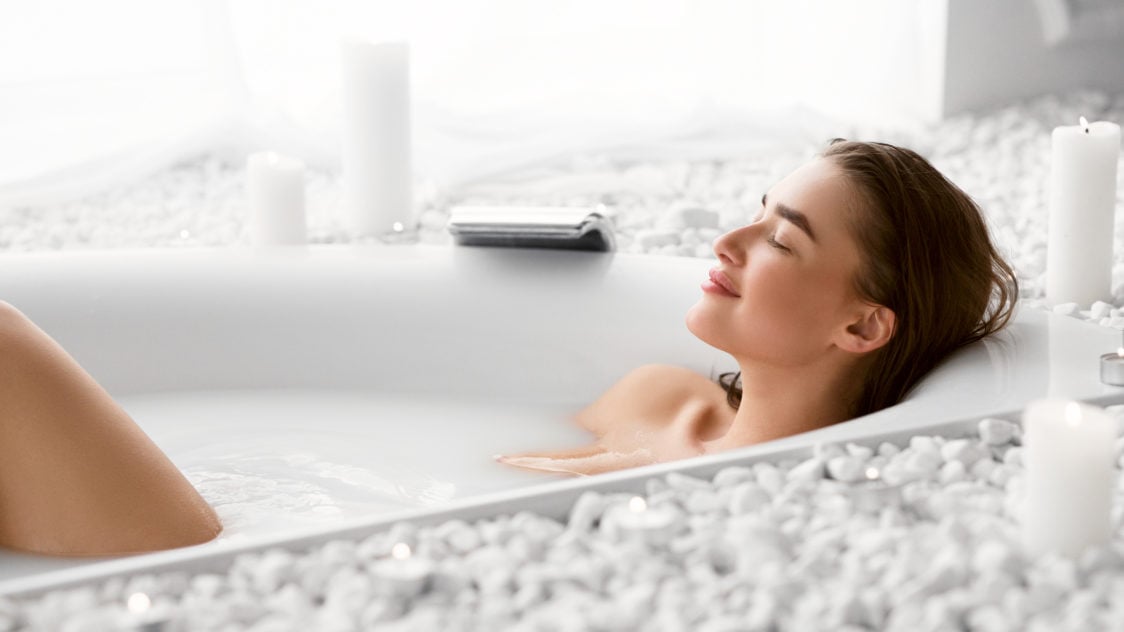
Types of self-care and their benefits
Self-care can be divided into three basic categories: emotional, physical and spiritual. Below we will discuss each of them in more detail.
1. Emotional self-care
It helps you to realize your emotional and spiritual needs and manage unpleasant feelings such as anger, sadness or anxiety. It can be a simple relaxing activity, like a meeting with friends or a cinema trip. However, part of the emotional self-care can be saying NO to things that cause unnecessary stress.
To determine if you struggle with emotional self-care, ask yourself these questions:
- Can you process your emotions in a healthy way?
- When was the last time you saw your friends?
- Do you participate in activities that could help recharge your energy?
- Are you able say no?
Benefits of emotional self-care
Emotional self-care allows you to feel better and more confident when dealing with everyday life’s issues. Many studies supported this claim and one of them found a connection between negative thinking and health itself. According to scientists, people with negative thoughts are more prone to health problems. Conversely, positive thinking is associated with healthier and happier people.
According to a 2008 ScienceDirect study, people diagnosed with cancer can also benefit from emotional self-care. According to the researchers, care in this direction helped patients to accept their diagnosis and keep a cool head. This ultimately contributed to better coping with the emotional burden and side effects associated with the treatment. [17–18]
You might be interested in these products:
2. Physical self-care
It is a reaction to the needs of your body. And if you take care of them, as a reward, you’ll feel better. Good ways to practise physical self-care are getting enough sleep, drinking enough liquids, or choosing healthy foods.
If you want to determine if there are areas of physical self-care that you should improve on, answer the following questions:
- Are you getting enough sleep?
- Is your diet rich in all the necessary nutrients?
- Do you care of your physical health?
- Do you exercise enough?
- Do you drink enough liquids?
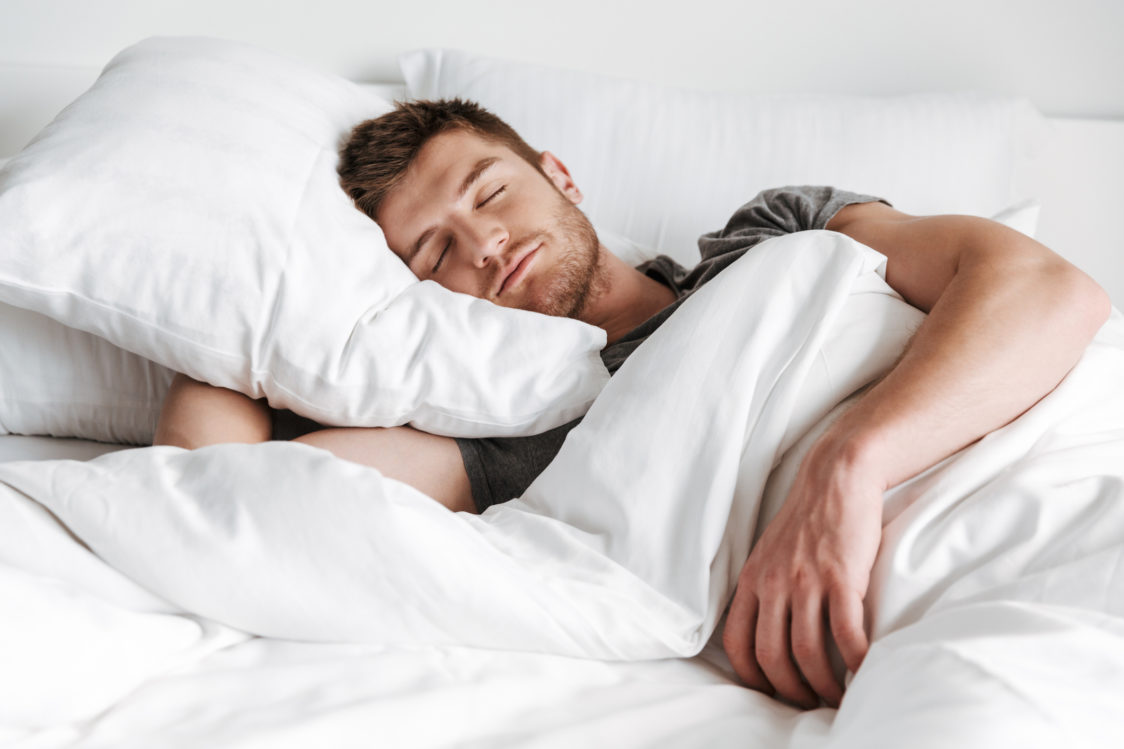
Benefits of physical self-care
Physical activity
A number of health benefits are also associated with physical self-care. For exercise, we could mention, for example, its effect on the immune system, which was also confirmed by a Journal of Sport and Health Science study from 2019. It found that regular exercise can improve the body’s defences and has an anti-inflammatory effect. And according to another study, people who exercise two to eight hours a week can reduce the risk of mortality by 29 to 36%.
- If you are further interested in this topic and want to discover other benefits of exercise, read our article Why Should You Exercise? Stronger Immunity, Heart Health and 8 Other Reasons.
Sleep
Physical self-care also includes getting enough sleep. Something that should definitely not be underestimated. A good sleeping schedule can help to maintain many biological processes, which include, for example, healthy functioning of the brain or proper functioning of the body’s defence mechanisms. Poor sleep can worsen these functions, or even make them dysfunctional. 7–9 hours a day is viewed optimal, considering that the exact need for sleep varies from person to person. [9] [31]
- We covered this topic more in the article What Happens to Your Body When You Don’t Get Enough Sleep, which explains the effect of lack of sleep on your overall health.
Liquids Intake
When talking about physical self-care, one definitely shouldn’t forget about liquids intake. Water is a kind of alpha and omega in the functioning of our organism. All metabolic processes take place in the water environment, and our organism is actually mostly made of water as well. Through water, waste substances are excreted from the body, it can regulate body temperature and helps the brain to work. In addition, all metabolic processes also take place in the water environment. [10]
- If you want to learn more about the importance of liquids intake, read our article How Insufficient Water Intake Affects Your Health.
Healthy diet
Last but not least, eating healthy foods is part of physical self-care. A healthy diet is associated with a lower risk of cardiovascular diseases or a lower body weight, which, for example, reduces the likelihood of type 2 diabetes and acts as a prevention against joint problems. A healthy plate should also include fibre, prebiotics and probiotics, which support optimal digestive function. [11–13]
- If you want to learn how to eat healthier, read our article What Is a Healthy Diet and How to Learn to Eat Healthy?
When it comes to physical self-care of your body, you should not forget about spending some time in nature. A study by the renowned scientific journal Lancet looked at this issue. It came to the conclusion that people who spend more time in green areas have a lower risk of mortality than someone who avoids nature at all costs. [14]

3. Spiritual self-care
This entails an awareness of our spiritual needs and the deeper meaning of life. It can be, for example, attending church, doing yoga or spending time in nature. Spiritual self-care also includes meditation, acts of kindness, or keeping a journal of things you are grateful for.
If you are contemplating about the state of your spiritual health, ask yourself questions such as:
- Do you engage in spiritual practices that fulfil you?
- When was the last time you were in nature?
- What are you grateful for in your life?
Benefits of spiritual self-care
Many studies also looked at the benefits of spiritual self-care. One of them came to the conclusion that spiritually oriented people are associated with a more optimistic approach to life. In addition, according to the researchers, they are more resistant to stress and have also been observed to have lower levels of anxiety. [15]
However, spiritual self-care is not necessarily connected only with religion. It often includes yoga, which can contribute to better stress management, helps with mental relaxation and with clearing the mind of unpleasant thoughts. In addition, it can improve flexibility and strength, increase the level of energy or vitality. [16]
The above-mentioned types of self-care could be further divided into temporary and permanent. A good example of the first category is meeting friends. This will bring you pleasure in the form of social connection or relaxation, which, however, will gradually disappear after you leave. On the other hand, permanent care has longer-term effects. It can be, for example, self-awareness of the good things in your life or applying the principles of mindfulness. [3–4]
- If you are more interested in this topic, read our article Biohacking: 7 Tips that Will Make Your Life Better In Every Way.
Tips on how to take care of yourself
Generally known healthy lifestyle recommendations are probably the first thing which comes to mind. These include regular exercise and a healthy diet, which are the cornerstones of physical self-care. However, below we will look at lesser-known tips on how to practise self-care in various ways. Different people can adopt different self-care practices and even your own definition of self-care can change over time. Self-care needs also differ from person to person and therefore we bring you several universal tips from which you can choose.
1. Go outside and be more active
Getting outside and getting more exercise in your life can be a great way to improve your physical and mental health. Spending some time in nature could be exactly the right thing. You can also try a short walk around the block, taking your pet for a walk, going for a run or exercising at one of the street workout spots.
Benefits of being outdoors
Many benefits are associated with movement and being outdoors, such as [19]:
- Mood improvement
- Reducing feelings of stress and anger
- Being more relaxed
- Improving physical health
- Closer connection with the environment in which you live
Being active has a positive effect on your well-being in general, and it can also help you burn more calories and improve your figure. This goes hand in hand with higher self-esteem, which in turn brings a better feeling about yourself. It is a kind of endless loop of benefits that feed on each other. They will help you feel better and thus support your physical self-care.
In this regard, you can refer to the WHO recommendation, according to which every person should devote at least 150 minutes of moderate-intensity physical activity or 75 minutes of high-intensity activity per week. [20]
- If you are further interested in supporting your physical health and taking care of your body, be sure to read our article 10 Unexpected Benefits of Exercise that Will Improve Your Life.
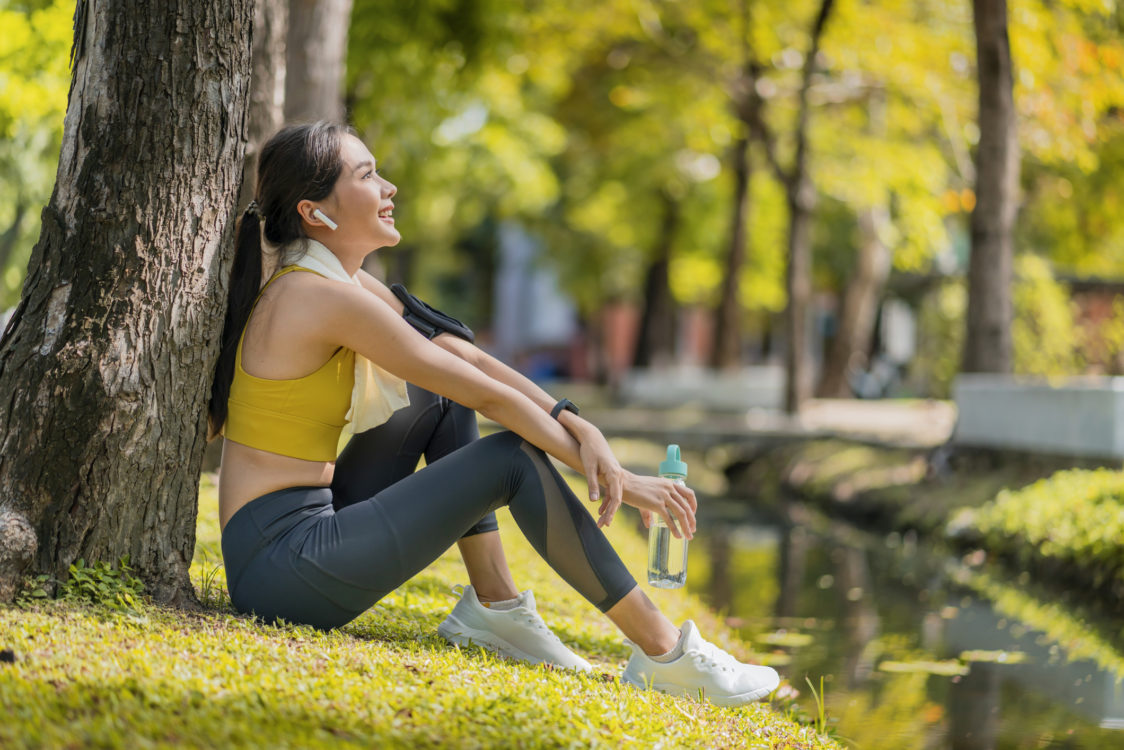
2. Set boundaries and plan your self-care routine
Time for self-care is important, so you shouldn’t underestimate planning it. Try to add one new activity that will make you happy and help you recharge your energy in your day. Whether it is reading a good book, playing a musical instrument, watching a series, visiting a cinema or theatre. Or it can be any other joy in life or a hobby such as listening to music, playing video games, writing a journal or building LEGO sets. And of course, don’t add this activity just for today. Try to plan it for the future as well.
How to plan a good self-care strategy?
The following steps can help you with a self-care strategy [4]:
- Keep your needs in mind – make a list of the things you deal with every day (work, school, family…)
- Identify your stress factors – think about the things that cause you stress and how you can deal with them
- Design your own self-care procedures – think about activities that make you happy and help you feel better (hobbies, time with friends, etc.)
- Plan a challenge – if you determine that you are neglecting certain aspects of your life, create a plan to give them some space
- Take small steps – don’t tackle everything at once. Think of a small step you can take ASAP
- Plan the time you need for yourself – if you feel like you don’t have time to fit several things into your day, try to make self-care a priority and your body and mind will surely repay you
And finally, set boundaries and learn to say no to things that don’t make you happy. This can seem very hard for many people, especially if they are asked to do something by family or close friends. But if you’ve had a hard day or feel like you need to rest, saying NO is totally okay. It may seem difficult at first, but once you learn to politely decline things that don’t make sense to you and don’t make you happy, you’ll gain more time for yourself and feel more confident. [21]
3. Disconnect from social networks and your smartphone
Today’s hectic time is full of different news outlets, social networks and other attractions that compete for your attention. The result is dozens of notifications, and the feeling that you are constantly missing out on something. This can cause sensory overload associated with discomfort, stress or irritability. What to do if this is how you feel? Try to disconnect for a few days from daily news and mindless scrolling of social networks.
Turn off your TV and limit notifications on your smartphone or tablet. Log out of social networks and do not open the laptop, unless you need to as a part of your job. At first, it may seem difficult, especially if you usually spend a significant amount of time on social networks. To ease yourself in this situation try reminding to yourself that you are not disconnecting forever and you are submitting to peace only for a few days. In the beginning, feel free to try just one day break, and if you need, return to social networks after that. You may find that it might be worth limiting your time spent online as it could bring more peace of mind to your life. [22–23]
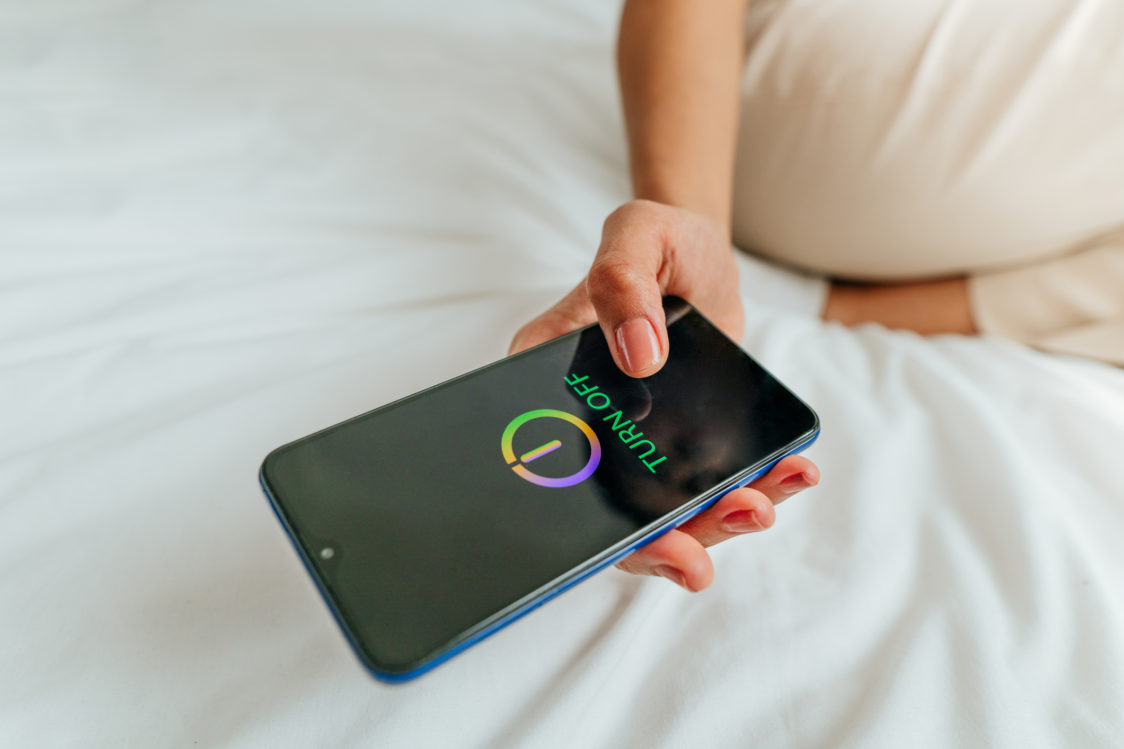
4. Try meditation
In general, meditation is an activity aimed at calming the mind. There are many types of it, but they are all united by the emphasis on breathing. They can help you calm down, relieve stress or change your relationship with yourself. It is thus an effective method of self-care, and various studies also speak in its favour. An example is research from 2012 that found that meditation can help reduce symptoms of anxiety. In addition, it can also reduce stress or improve sleep. [24–26]
How to meditate – simple guide for beginners
If you are new to meditation, try using this short guide to help you [27]:
- Find a calm and quiet place to sit or lie down
- Close your eyes
- Breathe naturally. Focus your attention only on breathing. Focus on each inhale and exhale. Notice the movement of your body as you breathe. Watch the chest, shoulders and abdomen. Concentrate on breathing without controlling its pace or intensity
- If your mind wanders for a moment, come back and focus on your breathing again
- After a few minutes you can end the meditation
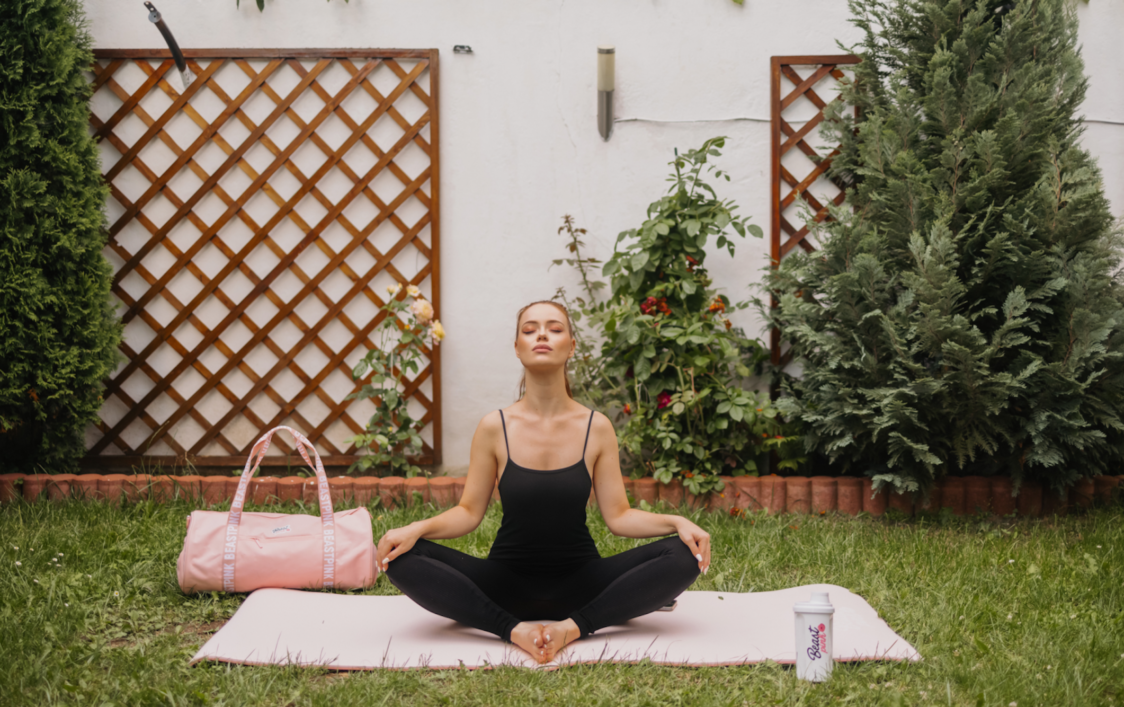
5. Refill your water bottle every hour
This easy activity can help you maintain a sufficient liquids intake. Your body needs fluids to keep many biological processes working properly.
How does insufficient liquids intake affect health
Lack of water leads to dehydration, which is accompanied by the following symptoms [28]:
- Being thirsty
- Dry mouth
- Dizziness
- Darker urine
- Headache
- Muscle weakness
- Urinating less than four times a day
The Institute of Medicine of the National Academies recommends drinking 30-45 ml of water per kilogram of body weight every day. In the case of an average 65 kg woman, this would be at least 1.8 litres. For an 85 kg man, it would mean at least 2.5 litres. [29]
It could be helpful to get your own water bottle and refill it every hour. You can take it with you anywhere and take care of your liquids intake not only at home, but also at work or on the go. This will once again support your health and overall self-care.
6. Clean your environment and surroundings
You can support your sense of well-being by getting rid of that pile of unnecessary things on your desk, clearing out your overloaded wardrobe or organising the mess around your shoe rack. Studies link the view of a crowded environment with stress and lower self-control. Try to focus on one messy part of the house at the time and spend at least 20 minutes on it. Feel free to take a picture of this place before, so that after cleaning you can compare how it has changed and how do you feel about it. [30]
Conclusion
The ability to take care of yourself through being aware of your own needs (self-care) is especially important in today’s hectic world. Its benefits can manifest themselves in many different areas of your life and thus help you to get greater satisfaction and a sense of happiness. Whether you decide to support your emotional, physical or spiritual self-care, we hope you’ll get inspired by our tips. They will help you define areas that need to be worked on and take the first steps to support your self-care.
[1] Nicole Martínez, Cynthia D. Connelly, Alexa Pérez a Patricia Calero - Self-care: A concept analysis – https://www.ncbi.nlm.nih.gov/pmc/articles/PMC8488814/
[2] Self-care interventions for health – https://www.who.int/health-topics/self-care#tab=tab_1
[3] Moira Lawler - What Is Self-Care and Why Is It So Important for Your Health? – https://www.everydayhealth.com/self-care/
[4] Elizabeth Scott - 5 Self-Care Practices for Every Area of Your Life – https://www.verywellmind.com/self-care-strategies-overall-stress-reduction-3144729
[5] Erin E. Ayala, Jeffrey S. Winseman, Ryan D. Johnsen & Hyacinth R. C. Mason - U.S. medical students who engage in self-care report less stress and higher quality of life – https://bmcmededuc.biomedcentral.com/articles/10.1186/s12909-018-1296-x
[6] Chelsie Monroe, Figaro Loresto, Sara Horton-Deutsch, Cathryn Kleiner, Kathryn Eron, Robert Varney, Stephanie Grimm - The value of intentional self-care practices: The effects of mindfulness on improving job satisfaction, teamwork, and workplace environments – https://www.psychiatricnursing.org/article/S0883-9417(20)30559-8/fulltext
[7] David C.NiemanaLaurel, M.Wentzb - The compelling link between physical activity and the body's defense system – https://www.sciencedirect.com/science/article/pii/S2095254618301005#
[8] Pedro F. Saint-Maurice, Diarmuid Coughlan, Scott P. Kelly - Association of Leisure-Time Physical Activity Across the Adult Life Course With All-Cause and Cause-Specific Mortality – https://jamanetwork.com/journals/jamanetworkopen/fullarticle/2727269
[9] Kamal Patel - How Important Is Sleep? – https://examine.com/articles/how-important-is-sleep/
[10] Natalie Silver - Why Is Water Important? 16 Reasons to Drink Up – https://www.healthline.com/health/food-nutrition/why-is-water-important
[11] Tiffany L. Carson, Bertha Hidalgo, Jamy D., MD Olivia Affuso - Dietary Interventions and Quality of Life: A Systematic Review of the Literature – https://www.jneb.org/article/S1499-4046(13)00629-5/fulltext
[12] Ramón Estruch, Emilio Ros, Jordi Salas-Salvadó, Maria-Isabel Covas - Primary Prevention of Cardiovascular Disease with a Mediterranean Diet – https://www.nejm.org/doi/10.1056/NEJMoa1200303
[13] Mari C. W. Myhrstad, Hege Tunsjø,Colin Charnock, Vibeke H. Telle-Hansen - Dietary Fiber, Gut Microbiota, and Metabolic Regulation—Current Status in Human Randomized Trials – https://www.mdpi.com/2072-6643/12/3/859
[14] David Rojas-Rueda, Mark J Nieuwenhuijsen, Mireia Gascon, Daniela Perez-Leon, Pierpaolo Mudu - Green spaces and mortality: a systematic review and meta-analysis of cohort studies – https://www.thelancet.com/pdfs/journals/lanplh/PIIS2542-5196(19)30215-3.pdf
[15] Dustin A Pardinia, Thomas G Planteb, Allen Shermanc, Jamie E Stumpd - Religious faith and spirituality in substance abuse recovery: Determining the mental health benefits – https://www.sciencedirect.com/science/article/abs/pii/S0740547200001252
[16] The Benefits of Yoga – https://osteopathic.org/what-is-osteopathic-medicine/benefits-of-yoga/
[17] G.D. Bishop - Emotions and Health – https://www.sciencedirect.com/science/article/pii/B008043076703802X?via%3Dihub
[18] Lisa Kidd, Nora Kearney, Ronan O’Carroll, Gill Hubbard - Experiences of self-care in patients with colorectal cancer: a longitudinal study – https://onlinelibrary.wiley.com/doi/10.1111/j.1365-2648.2008.04796.x
[19] Nature and mental health – https://www.mind.org.uk/information-support/tips-for-everyday-living/nature-and-mental-health/how-nature-benefits-mental-health/
[20] Physical Activity for a Healthy Weight – https://www.cdc.gov/healthyweight/physical_activity/index.html
[21] Tchiki Davis - Self-Care: 12 Ways to Take Better Care of Yourself – https://www.psychologytoday.com/us/blog/click-here-happiness/201812/self-care-12-ways-take-better-care-yourself
[22] Jayne Leonard - What to know about sensory overload – https://www.medicalnewstoday.com/articles/sensory-overload#what-it-is
[23] A Guide to Practicing Self-Care with Mindfulness – https://www.mindful.org/a-guide-to-practicing-self-care-with-mindfulness/
[24] Kevin W Chen, Christine C Berger, Eric Manheimer, Darlene Forde, Jessica Magidson, Laya Dachman, C W Lejuez - Meditative therapies for reducing anxiety: a systematic review and meta-analysis of randomized controlled trials – https://pubmed.ncbi.nlm.nih.gov/22700446/
[25] Madhav Goyal, Sonal Singh, Erica M S Sibinga, Neda F Gould, Anastasia Rowland-Seymour, Ritu Sharma - Meditation programs for psychological stress and well-being: a systematic review and meta-analysis – https://pubmed.ncbi.nlm.nih.gov/24395196/
[26] Jason C. Ong, Rachel Manber, Zindel Segal, Yinglin Xia, Shauna Shapiro, James K. Wyatt - A Randomized Controlled Trial of Mindfulness Meditation for Chronic Insomnia – https://academic.oup.com/sleep/article/37/9/1553/2416992
[27] MEDITATION 101: TECHNIQUES, BENEFITS, AND A BEGINNER’S HOW-TO – https://www.gaiam.com/blogs/discover/meditation-101-techniques-benefits-and-a-beginner-s-how-to
[28] Peter Costa - What you should know about dehydration – https://www.medicalnewstoday.com/articles/153363#symptoms
[29] Ana Isabel Laja García, Carmen Moráis-Moreno, M de Lourdes Samaniego-Vaesken, Ana M. Puga, Teresa Partearroyo - Influence of Water Intake and Balance on Body Composition in Healthy Young Adults from Spain – https://www.ncbi.nlm.nih.gov/pmc/articles/PMC6723835/
[30] Stephanie McMains, Sabine Kastner - nteractions of top-down and bottom-up mechanisms in human visual cortex – https://pubmed.ncbi.nlm.nih.gov/21228167/
[31] National Sleep Foundation’s sleep time duration recommendations: methodology and results summary – https://www.sciencedirect.com/science/article/abs/pii/S2352721815000157


Add a comment